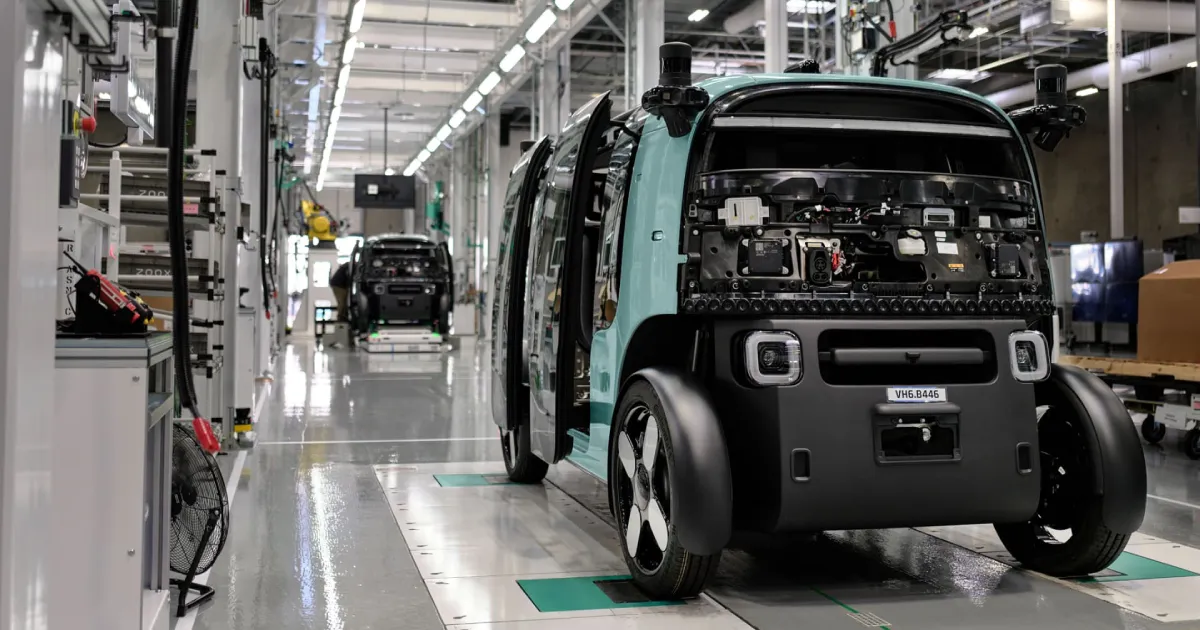Amazon's Zoox opens 220,000 sq-ft robotaxi factory in California

Amazon-backed Zoox has taken a major step forward in the autonomous vehicle race with the opening of its first dedicated robotaxi production facility in Hayward, California. Announced on Wednesday, the 220,000-square-foot site marks the beginning of Zoox’s move toward full-scale commercial deployment, positioning it as a direct competitor to Alphabet’s Waymo and Elon Musk’s Tesla in the rapidly evolving robotaxi industry.
Purpose-Built Autonomy
What sets Zoox apart in the crowded field is its ground-up approach to vehicle design. Unlike Waymo and Tesla, which retrofit existing vehicles or adapt production models for autonomous use, Zoox’s vehicles are purpose-built for autonomy. The company’s robotaxis feature a compact, bidirectional design without traditional controls like steering wheels or pedals — resembling what some describe as “toaster ovens on wheels.” This unique design underscores Zoox’s vision for a fully driverless experience tailored to urban mobility.
Scaling for Demand
Zoox stated the new facility is capable of producing over 10,000 robotaxis annually at full capacity, although initial production targets remain undisclosed. The company emphasized that growing demand and future expansions into new markets justify the ramp-up in manufacturing. The production boost comes as Zoox prepares to commercially launch in Las Vegas later this year, with San Francisco expected to follow. The company is already conducting testing in multiple U.S. cities with a fleet of over 20 autonomous vehicles and currently operates in San Francisco’s SoMa (South of Market) district.
Zoox anticipates onboarding public riders soon, signaling its transition from development and testing to full-scale operations.
Intensifying Competition
The robotaxi industry is heating up. Zoox's entry adds another major player to a field already dominated by seasoned competitors. Waymo, a pioneer in the space, has been operating fully driverless rides for years and is now expanding across several major U.S. cities. Tesla, meanwhile, is preparing to launch its robotaxi service on June 22, starting with Model Y SUVs enhanced with self-driving software. Musk’s company is also working on a custom-designed two-seat “Cybercab,” which, like Zoox’s vehicle, will omit traditional manual controls.
Industry Challenges
Despite the technological advancements, the road to commercialization remains complex. Autonomous vehicle developers face ongoing scrutiny from federal regulators, high operational costs, and evolving safety standards. All three companies — Zoox, Waymo, and Tesla — have been involved in investigations and recalls related to collisions involving their autonomous systems.
Nevertheless, Zoox's move into serial production signals growing confidence in the viability of autonomous ride-hailing services and sets the stage for heightened competition in the mobility market.
As the race to deliver fully autonomous transport accelerates, Zoox’s unique vehicle design and backing from Amazon position it as a serious contender aiming to redefine urban transportation.





